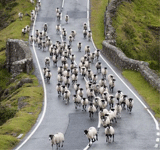| Efforts to Preserve Fishing Culture underway in Jiaozhou Bay | |||||||||||
|
|||||||||||
//english.dbw.cn 2017-02-14 10:18:32 |
|||||||||||
 The salt pan culture, which was widely spread thousands of years ago, at the Jiaozhou Bay in the eastern Chinese city of Qingdao, is gradually disappearing. This is due to tremendous changes that have been taking place in the coastal towns, whereby in the past, locals used to rely on fishing and extraction of salts from the sea. These customs and traditions along with their previous methods of production have unfortunately become a rare phenomenon. Xu Fei finds out why. Reporter: 67-year old Yin Suzhen, a resident of Hanjia Folk Custom village in Qingdao's high-tech zone, is singing. She wraps her head in a scarf and holds a shovel, trying to recall the scene on how local women used to harvest clams. "As soon as the north wind blew causing big tides, local women would use their shovels to dig out clams one by one. There was no other way to speed up the process." As the time went by, the way of production and life changed dramatically. Today, there are no young girls singing. The fishermen who used to repair ships while others weaved fishing nets, have also totally become history. 78-year-old Han Xinde is a villager in Hanjia Folk Custom village. Fifty-eight years ago, Han Xinde used to accompany his father to make fishing nets and fishing boats. Another part of their routine involved going fishing together. It was the rich varieties of seafood and vastness of the waters that mesmerized him. Han Xinde recalls:"The marine products at Jiaozhou Bay appeared a lot fresher than those from elsewhere. At that time, the Bay didn't have any farms, and owned a much larger marine area. Fishermen, oftentimes, wanted to release the fish they had caught in hopes to facilitate their reproduction. At five or six p.m. those fishing boats, all loaded with fish as well as other marine products, would return, with the fishermen's faces full of smiles." The Hongdao Island, seemingly in the shape of a seashell, is embraced by the Jiaozhou Bay. However, the excessive development of salt evaporation ponds around the year of 1913 resulted in the destruction of beach wetlands and the retreat of sea water. Decades later, the water area of Jiaozhou Bay has largely shrunk. Xiao Xiangshan is a local researcher who's been documenting the island's evolution history."The Jiaozhou Bay has reduced by at least two-sevenths of the original size. Its water capacity used to reach half way up the Mashan hill. But gradually its volume reduced,forcing 70 percent of the fishermen who bred shrimp and sea cucumber to disengage from the fishing industry." Similarly, local salt evaporation ponds have since also expired. Hongdao once rose to fame thanks to the local salt manufacturing industry in late 19th century. When the city's sprawling salt pans spread all over the place, people would describe the salt pan as looking like a sea of silver. Han Xinde witnessed the prosperity of salt pans."Salt was generated when the seawater got heated. Ponds were built thereafter for the evaporation process. The salt was then gathered using mechanical harvesting machines. There was no human labor involved, and productivity remarkably improved. About 300 meters of the northern side of Folk Custom Village would all be covered by salt pans." As time passed, unfortunately these unsophisticated ways of production inevitably had to disappear. Consequently, the disappearance of these salt pans, ancient temples and fishing villages has also, more or less, weakened the local folk customs. Meanwhile, some locals have tasked themselves with preserving some aspects of the dying culture by collecting and keeping discarded fishing nets and other old tools within the village. As a result, they are conserving their old fishing culture and turning this village into a tourist attraction. Han Xinde explains:"The Folk Custom Village was built to inherit and spread the fishing culture. Here visitors can get a fresh feel of the past, as they are able to see every type of tool used in netting, boating and fishing." Along with the preservation of fishermen's heritage, their strong belief is something to be admired. Every year ahead of the tomb-sweeping day, a large sacrifice ceremony is held in this Folk Custom Village. The fishermen who make a living on sea offer their sacrifices to the fishing folk god "Lang Jun". According to Xiao Xiangshan, the sacrifice ceremony had been suspended for years before it was restored back in 2012.Xiao Xiangshan points out the significance of this ceremony. "Lang Jun taught our ancestors fishing, and helped in the development of local fisheries. At present, the sacrifice ceremony for Lang Jun is held annually, arousing interest from the younger generation of people. They hope this fishing history and culture can be passed down from one generation to the next."For now, the good news is, this dynamic process of inheriting the local fishing culture has added elements of poetry to the Jiaozhou Bay. |
|||||||||||
| Author: Source:CRI Editor:Yang Fan |
|||||||||||
 中文简体
中文简体










